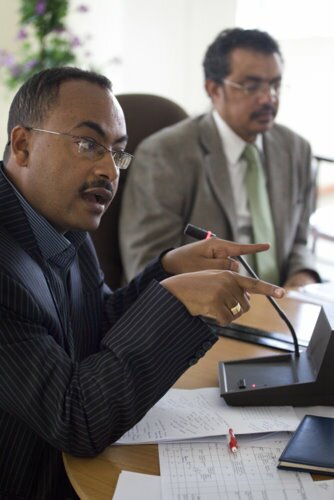Linking family planning and country ownership: Ethiopia shares five strategies for success
 Minister Kesete Photo Credit Dominic Chavez |
It is great when all the pieces come together. At the final plenary of the International Conference on Family Planning in Dakar earlier this month, I was struck by how State Minister Kesetebirhan Admassu of Ethiopia’s Federal Ministry of Health connected the importance of country ownership and aid effectiveness with access to reproductive health and family planning.
Ethiopia has made great progress on reproductive health in recent years, increasing contraceptive prevalence from 14 percent to 29 percent since 2005. Minister Kesete (as he is known) shared the five strategies that he believes have led to their success. They do not pertain to just family planning. Or even just the health sector. They are applicable to every sector in development and reflect a growing movement toward country ownership and good governance. And they are a constant theme in the work carried out in MLI countries
While few speakers were interrupted by applause, Minister Kesete paused several times as the audience affirmed his powerful message:
Country ownership: "Country ownership at the top level to the bottom level needs to exist," he said. This means “having the guts to say no to donors” when the projects do not match national priorities and plans, he said.
Community ownership: At the community level, there is a need to reach families. Ethiopia’s Health Extension Workers s educate families. “They empower them so they can decide on how many children they want to have,” he said.
Going to scale: “It’s time to end pilots and implement” programs, he said, adding, “We need to get things done.” The Health Extension Worker program, which has trained 38,000 workers, has become a model for community-based health programs on a national scale.
Task shifting: All developing countries are facing the loss of professional health workers. He said this is why it is important to shift work to lower levels if standards can be maintained. In Ethiopia, this means allowing Health Extension Workers in communities to administer injectable contraceptives, a method of choice for many women. This has been a major factor in the doubling of Ethiopia’s contraceptive prevalence rate in the last five years.
Partnership: “As poor countries, we cannot do it alone,” Minister Kesete said. He highlighted the need for partnerships though programs like the International Health Partnership (IHP+) and basket funds. “And implementing partners need to be held accountable to mutually agreed upon results frameworks.” At the country level, he emphasized the importance of “one plan, one budget, one report” that reflects the priorities of country leaders and reinforces the spirit of partnership.
When I had a chance to speak with Minister Kesete after the program, I told him his message was “music to my ears.” It was really the only time in the conference that the principles of aid effectiveness, outlined in the Paris Declaration, Accra Agenda, and IHP+, were outlined.
Our work with our MLI countries has demonstrated country ownership is essential for health programs to be taken to national scale. And strong political leadership at the country level is the only way national governments will invest in and sustain country-led health programs. Minister Kesete’s compelling message on Ethiopia’s major achievements in family planning and reproductive health reaffirmed that when political leadership and political will are harnessed and leveraged at the country level, better results can be attained.
Keyword Search
MLI works with ministries of health to advance country ownership and leadership. This blog covers issues affecting the ministries and the people they serve.
Connect with Us
![]()
![]()
Categories
Blogs We Like
- Africa Can End Poverty
- Africa Governance Initiative
- Behind the Numbers
- CapacityPlus
- Center for Global Health R&D Policy Assessment
- Center for Global Development: Global Health Policy
- Center for Health Market Innovations
- Global Health
- Global Health Hub
- Global Health Impact
- The New Security Beat
- PAI Blog
- RH Reality Check
- Save the Children
- Transparency and Accountability Program
Contact Us
Please direct all inquiries to
